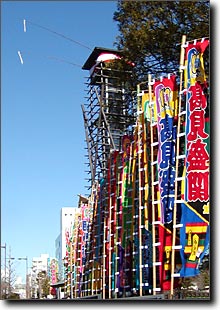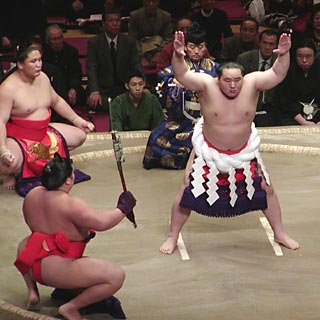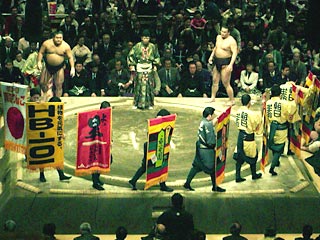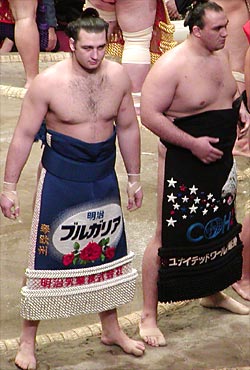- Miscellaneous top
- About Japanese politics
- Upper House Election 2025
- Upper House Election 2022
- From the LDP to the DPJ
- Upper house is needed?
- Nuclear accident at Fukushima
- Japan in March 2011
- Olympic 2020 and COVID-19
- About Japanese society
- Eternal value taker
- Our lost cultural heritage
- Fish consumption in Japan
- Priority seats
- Dangerous bicycles
- Sumo scandal and yakuza
- TV wide show
- About history
- Pujie - Last Emperor’s brother
- Himiko in Hashihaka?
- Far Eastern ancient history
- Foreign topics
- Auckland
- Islamabad
- Moscow
- Teheran
- Kabul
- Death of Tanzania's President
Recent sumo scandal and connection with yakuza

Everything started with a weekly magazine report on the 19th of May that Ozeki Kotomitsuki was involved in illegal gambling presumably organized by yakuza on professional baseball games. Upon the recommendation of an independent investigation committee, Kotomitsuki and a stablemaster were dismissed and many other stablemasters and wrestlers were penalized. Having expressed its self-criticism in such a way, Sumo Kyokai (Sumo Assocition) started Nagoya Grand Tournament on the 4th of July. Sumo Kyokai further decided to entrust a former superintendent prosecutor of Tokyo with the conduct of Tournament as acting chairman, to suspend 11 sekitori wrestlers from participating in the Tournament and not to present the Emperor's Cup to the Tournament winner.
Despite such huge sacrifice by Sumo Kyokai, NHK decided not to televise the Tournament, about three forth of the private sponsors withdrew their prizes, only half of the usual visitors appeared at the Tournament by far and the Sumo bashing by the media continues. During the bashing a series of yakuza related scandals were additionally discovered; two stable masters arranged privileged tickets for yakuza leaders; stablemaster Takanohana, the super-popular yokozuna in the mid 1990s dined with a yakuza in the time the gambling scandal was going on; a stable rent a house from a yakuza during the stay in Osaka for Grand Tournaments; and another stable bought a land in Nagoya from a yakuza related company.
Yakuza connection is not yet satisfactorily proven for these cases. But, the media criticism against Sumo is so harsh and escalating that I am afraid that the whole affair might endanger the foundation of Sumo.

Asashoryu was the first yokozuna from Mongolia. He was a strong yokozuna and his fighting spirit was outstanding. However, his mal-behavior made many people angry at him and because of a minor scandal he was forced to resign, which then created a protest feeling in Mongolia.
I am a great sumo fan since my childhood. I was even an amateur sumo wrestler during schooldays and won several - not many - prizes. As a sumo fan, I am fascinated that powerful guys come from all over the world, make tremendous efforts to assimilate the Japanese lifestyle and compete one another in accordance with the Japanese traditional rules. The present situation of sumo is often compared with Wimbledon for tennis. Wimbledon is famous as mecca of tennis, but in recent years winners are non-British players. Many people use such an analogy with the wish that such a situation should be avoided. On the contrary, I welcome the "Wimbledon effect" and believe that this is the only way sumo can survive the 21st century. However, without support of Japanese fans and active participation of Japanese wrestlers, sumo can not maintain vitality and tradition, I believe. Therefore, I am anxious about the present situation and angry at the irresponsible media report and criticism, which would only produce the loss of peoples' interest in and support for the unique sport.
I presume non-Japanese people may not understand the connection of sumo with yakuza, in particular because the yakuza connection appears to be an important reason for the public criticism. Therefore, I will try to explain the role of yakuza for sumo, though I am not a yakuza expert.
Yakuza are accepted by the ordinary people since the feudal time, so far as they maintain security and order where police is not capable in doing so. Their crimes such as gamble and violence are tolerated, as far as they play a positive role and their violence is confined to themselves.
Yakuza earn money from every possible means including illegal activities such as drug trading, protection fee from amusement trades and land sharking. However, they organizational capabilities are relied upon in particular in conducting festivals and entertainment events in provinces - tidbits or mascot stalls at festivals are still usually organized by yakuza.
Yakuza used to have intensive contacts with all kinds of people in Japan (first and foremost politicians!) and especially with show business and entertainment industry including sumo, wrestling and other professional sports. When for example pop singers wanted to organize concerts in provincial towns, they used to depend on local yakuza. It is famous that Misora Hibari (1937-1989), the representative enka singer, was supported by Taoka Kazuo (1913-1981), the head of Yamaguchi-gumi, belonged to a theatrical agency owned by Yamaguchi-gumi and made a speech at Taoka's funeral. But, no body criticized her because of her connection to Yamaguchi-gumi. Her yakuza connection did not constitute an obstacle for her to win a highly authoritative "People's Honor Award" given by the prime minister.
Yakuza are accepted by the ordinary people since the feudal time, so far as they maintain security and order where police is not capable in doing so. Their crimes such as gamble and violence are tolerated, as far as they play a positive role and their violence is confined to themselves.
Yakuza earn money from every possible means including illegal activities such as drug trading, protection fee from amusement trades and land sharking. However, they organizational capabilities are relied upon in particular in conducting festivals and entertainment events in provinces - tidbits or mascot stalls at festivals are still usually organized by yakuza.
Yakuza used to have intensive contacts with all kinds of people in Japan (first and foremost politicians!) and especially with show business and entertainment industry including sumo, wrestling and other professional sports. When for example pop singers wanted to organize concerts in provincial towns, they used to depend on local yakuza. It is famous that Misora Hibari (1937-1989), the representative enka singer, was supported by Taoka Kazuo (1913-1981), the head of Yamaguchi-gumi, belonged to a theatrical agency owned by Yamaguchi-gumi and made a speech at Taoka's funeral. But, no body criticized her because of her connection to Yamaguchi-gumi. Her yakuza connection did not constitute an obstacle for her to win a highly authoritative "People's Honor Award" given by the prime minister.
|
"Kawa no Nagare no yoni" (Like the flow of a river) by Hibari Misora |
Politicians are not exceptions. Many experts report that the LDP government tried to put down the violent demonstrations against the extension of the Japan-US security pact in 1960 and organized through a right-wing boss Kodama Yoshio (he was a A-class war criminal and a CIA agent) several yakuza groups and mobilized some 30,000 people belonging to yakuza groups. Some politicians themselves are said to be yakuza; Hamada Koichi (1928-) from Chiba prefecture is a typical case. Though he retired as politician, he is popular as TV personality. It is really incredible that the same media criticize the connection between sumo wrestlers and yakuza.
Sumo is also an entertainment business. Sumo in the present style was created in the Edo period around 1800. Since the beginning, sumo wrestlers organized provincial tours between big tournaments held in Edo (present Tokyo) and earned their daily "rice". They needed the cooperation of influential persons in the province, in most cases yakuza, in organizing such tours. When Kitanoumi was chairman of Sumo Kyokai (2002-2008), he tried to organize provincial tours only with the staff of Sumo Kyokai, as he wanted to cut the connection with yakuza. But, unfortunately his reform did not bring enough success.
Apart from provincial tour, there is a factor which connects sumo with yakuza. Because ticket sales alone cannot satisfy the needs of sumo wrestlers and stablemasters and sumo business does not receive any subsidy from the government, it is understandable that sumo is by and large dependent upon sponsors. The dependence on sponsors belongs to the tradition of sumo. A special word for sponsor "Tanimachi" comes from the sumo world and indicates the characteristics of sumo business.

Private prises (some 600 US dollars) are announced by showing flags before the match.
At the beginning of sumo, sponsors were feudal lords and wealthy merchants. They gave money to wrestlers and were fond of having them as their attendants at entertainments. Their payment had a big share in the total income of sumo wrestlers. Even now all sumo stables have sponsors and without sponsors the management of stables is impossible. Against such a background, it is very natural that yakuza - their leaders have huge money at their discretion - become sponsors like company owners and rich merchants. In this regard big companies are not reliable, because their managers are employees and cannot invest much money to support sumo wrestlers or singers.
However, the whole society is in the process of getting rid of yakuza since the 1980s. It became necessary for politicians to present them as clean from dirty relations with yakuza. I do not know the reality at present, but at least the people who need public support such as politicians and TV personalities must keep themselves clean from yakuza,
Apart from provincial tour, there is a factor which connects sumo with yakuza. Because ticket sales alone cannot satisfy the needs of sumo wrestlers and stablemasters and sumo business does not receive any subsidy from the government, it is understandable that sumo is by and large dependent upon sponsors. The dependence on sponsors belongs to the tradition of sumo. A special word for sponsor "Tanimachi" comes from the sumo world and indicates the characteristics of sumo business.

Private prises (some 600 US dollars) are announced by showing flags before the match.
At the beginning of sumo, sponsors were feudal lords and wealthy merchants. They gave money to wrestlers and were fond of having them as their attendants at entertainments. Their payment had a big share in the total income of sumo wrestlers. Even now all sumo stables have sponsors and without sponsors the management of stables is impossible. Against such a background, it is very natural that yakuza - their leaders have huge money at their discretion - become sponsors like company owners and rich merchants. In this regard big companies are not reliable, because their managers are employees and cannot invest much money to support sumo wrestlers or singers.
However, the whole society is in the process of getting rid of yakuza since the 1980s. It became necessary for politicians to present them as clean from dirty relations with yakuza. I do not know the reality at present, but at least the people who need public support such as politicians and TV personalities must keep themselves clean from yakuza,
 Kesho-mawashi (Apron-like decorative belt) are also presents from sponsors |
The same can be said about "gambling". Private gambling is legally prohibited in Japan for decades. However, the prohibition was not so strictly executed, so long as gambling did not involve professional criminals. It was usual to bet when we played golf or mahjong. We used to bet thousands of dollars on a mahjong game till the end of 1980s, but nobody cared about it. Also here, the thinking of people changed very rapidly.
However, Sumo Kyokai could not keep pace with the rapid change of the peoples' mind-set and got involved in a fatal scandal.
I strongly hope that Sumo Kyokai will make the best use of the scandal and establish a totally new business model. Even now, the system of training wrestlers in stables is too much influenced by the obsolete style. The lifestyle of wrestlers must become more attractive to young applicants. Then being a sumo wrestler must become a lucrative business compared with other sports. In sumo only less than 70 sekitori wrestlers receive salary while hundreds of young wrestlers receive only a small amount of pocket money. Salary for yokozuna is about 500 thousand dollars. Adding up tips from sponsors, the income of might reach 1 million dollars, I presume. But, this amount is incomparably small if we see the salary of baseball players for example. Ichiro, now playing for the Seattle Mariners, playing with Seattle Mariners, is said to receive 18 million dollars. Adding up his income from CM and other sources, the difference is huge.
It is not easy to find a new and attractive business model for sumo. But, I hope sumo can regain its popularity as very attractive traditional sport-cum-entertainment. We should pay warm attention to sumo so that it can revitalize the unique and highly interesting tradition.